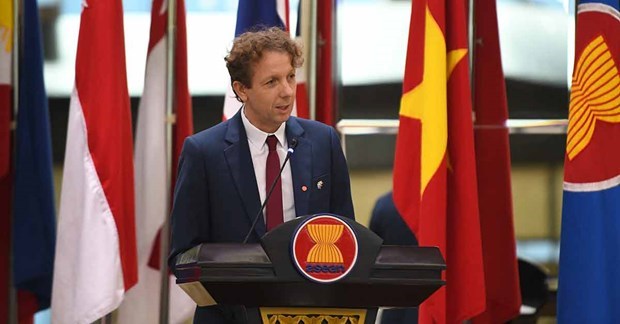 Politics & Law
Politics & Law


|
| EU Ambassador to ASEAN Igor Driesmans. Photo ASEAN Secretariat |
Upon the successful organisation of the 37th ASEAN Summit and Related Meetings in Hà Nội between November 12-15, Vietnam News Agency correspondent based in Jakarta, Indonesia had a quick interview via email with the EU Ambassador to ASEAN Igor Driesmans
EU and ASEAN are both open and preferring multilateralism in trade and business. So in your opinion, do you think there are any chances for a possible FTA between the two groups in the near future? And what are the factors that prevent such scenario? Can you explain more about it? And how can ASEAN and EU do to make it happen?
You are right, the EU and ASEAN are likeminded in our quest for effective multilateralism, not just in trade and business but in all areas – from climate change to maritime security. We need international rules to shield us from the logic that “might makes right”.
Concluding a region‐to‐region FTA is an objective which the EU and ASEAN share. In June this year, we touched base to discuss the prospects for the resumption of negotiations on an ambitious and comprehensive FTA.
We now have bilateral trade agreements in place between the EU and two ASEAN partners, Singapore and Việt Nam, and negotiations are ongoing with Indonesia and others. Those and other possible future bilateral agreements could serve as the building blocks towards deeper region‐to‐region relations.
The EU‐ASEAN Joint Working Group has done serious work in preparing the ground for further bi‐ regional engagement. This work shows that, while there are many important areas of commonality, there are also notable gaps, especially in areas of crucial importance to the EU, such as trade and sustainable development, public procurement and intellectual property rights.
The EU is keen to make progress in these and other areas, and we are ready to engage further.
With the recent signing of RCEP, do you think there will be more opportunities or more challenges for EU in boosting trade relations with ASEAN? And why do you think that?
Let me first congratulate ASEAN for the signing of RCEP. It demonstrates its members’ commitment to open, rules‐based trade and strengthens the centrality of ASEAN.
A more integrated market, doing away with tariffs and non‐tariff barriers will offer more trade and investment opportunities also for EU companies trading with or investing in ASEAN countries.
The EU’s approach to trade relations with ASEAN rests on two pillars, bilateral FTAs with members, as building blocks for a region‐to‐region FTA. If you think about it, this is exactly what came to conclusion of the regional comprehensive agreement: ASEAN+1 bilateral FTAs now consolidated into the single, overarching RCEP.
In this respect, RCEP is a reminder of ASEAN’s centrality in the wider region and the importance of region‐to‐region links. VNS




